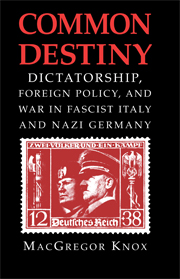Book contents
- Frontmatter
- Contents
- Acknowledgments
- List of abbreviations
- Introduction: War and revolution in Europe, 1789–1945
- Part I Origins and dynamics
- 1 Italy and Germany from unification to militant dictatorship, 1860–1933
- 2 Conquest, foreign and domestic, in Fascist Italy and Nazi Germany
- Part II Foreign policies and military instruments
- Conclusion
- Frequently Cited Works
- Index
1 - Italy and Germany from unification to militant dictatorship, 1860–1933
Published online by Cambridge University Press: 03 February 2011
- Frontmatter
- Contents
- Acknowledgments
- List of abbreviations
- Introduction: War and revolution in Europe, 1789–1945
- Part I Origins and dynamics
- 1 Italy and Germany from unification to militant dictatorship, 1860–1933
- 2 Conquest, foreign and domestic, in Fascist Italy and Nazi Germany
- Part II Foreign policies and military instruments
- Conclusion
- Frequently Cited Works
- Index
Summary
Fascism and Nazism twisted, or ended, the lives of hundreds of millions of people. Interest in their origins has prospered even in the present era of historical pointillisme. The most disdainful adherents of poststructuralist theory or of the social microhistory of everyday life find it difficult to deny that dictatorship, global war, and genocide can ruin your whole day.
The overall structures of the national histories of Italy and Germany from territorial unification in 1860/71 to dictatorship in 1922/33 and defeat in 1943/45 consequently remain subjects of passionate debate. Yet analysts of the origins of the Western interwar “Great Dictatorships” have for the most part avoided systematic comparison as a tool for understanding each country's trajectory. A few scholars have explored resemblances between the processes and consequences of territorial unification in the two cases, or have studied the regimes' structures or particular sectors within them in a comparative way. A vast body of writing linked to the concept of “fascism” (lower-case) has usually assumed a common parentage, sometimes due to shared features of the unification process and aftermath, although always within the framework of a generic concept that embraces other cases with entirely different origins and is itself prior to and independent of the evidence.
But most interpretations have followed the well-trodden and exclusive paths of the national historiographical Sonderwege. Heinrich von Treitschke and his successors sanctified Germany's supposed distinctness from the West.
- Type
- Chapter
- Information
- Common DestinyDictatorship, Foreign Policy, and War in Fascist Italy and Nazi Germany, pp. 7 - 52Publisher: Cambridge University PressPrint publication year: 2000

